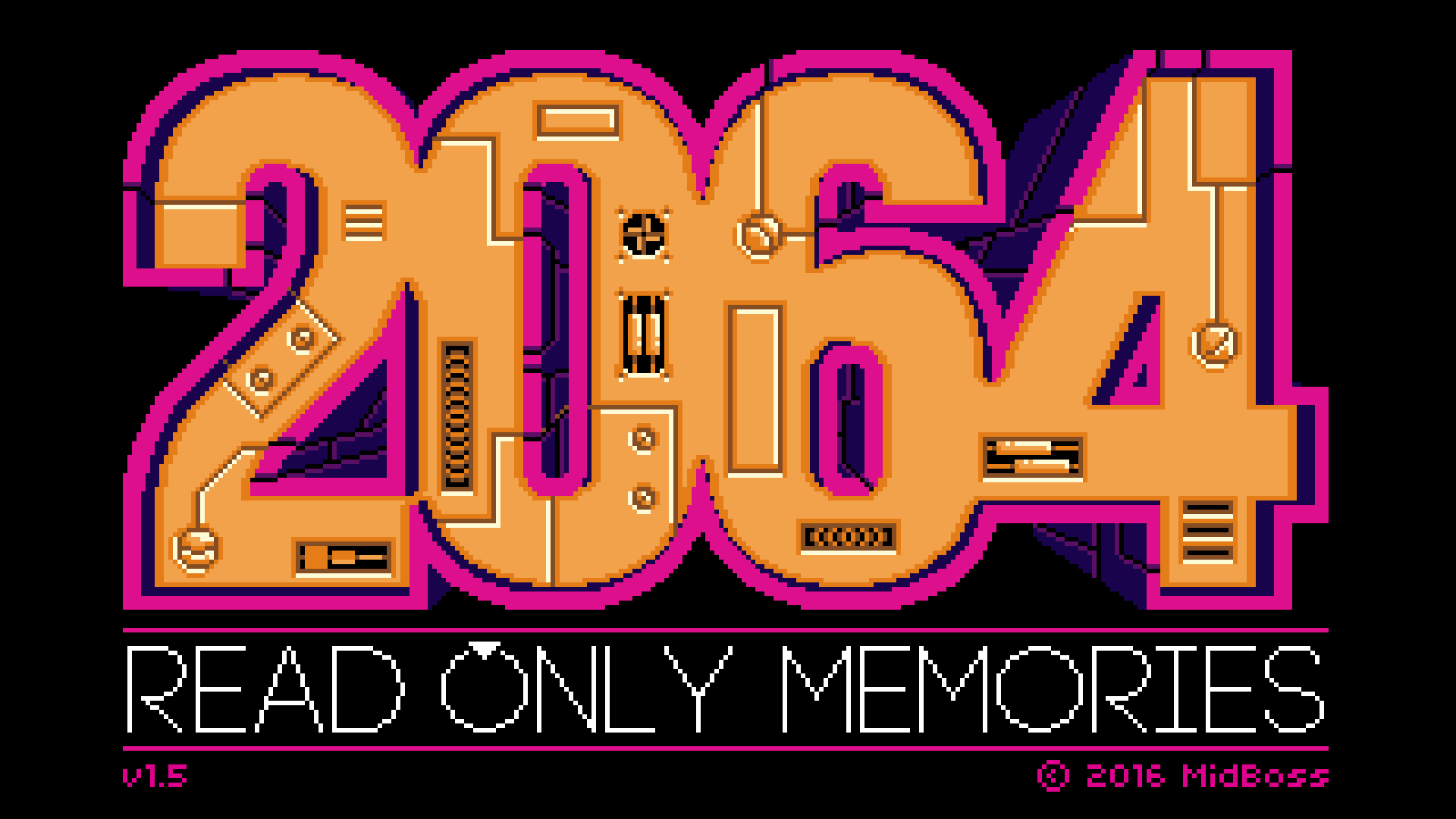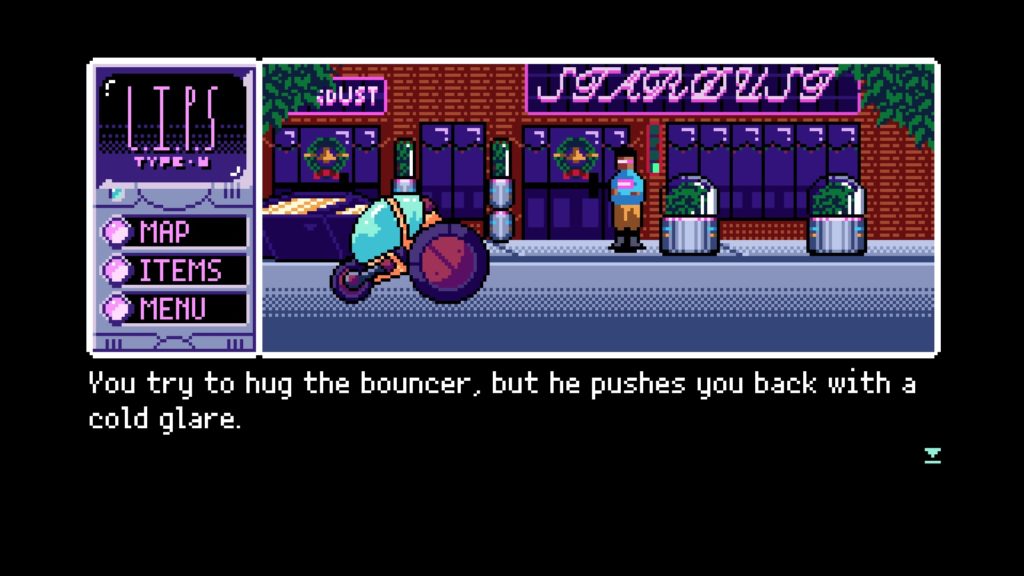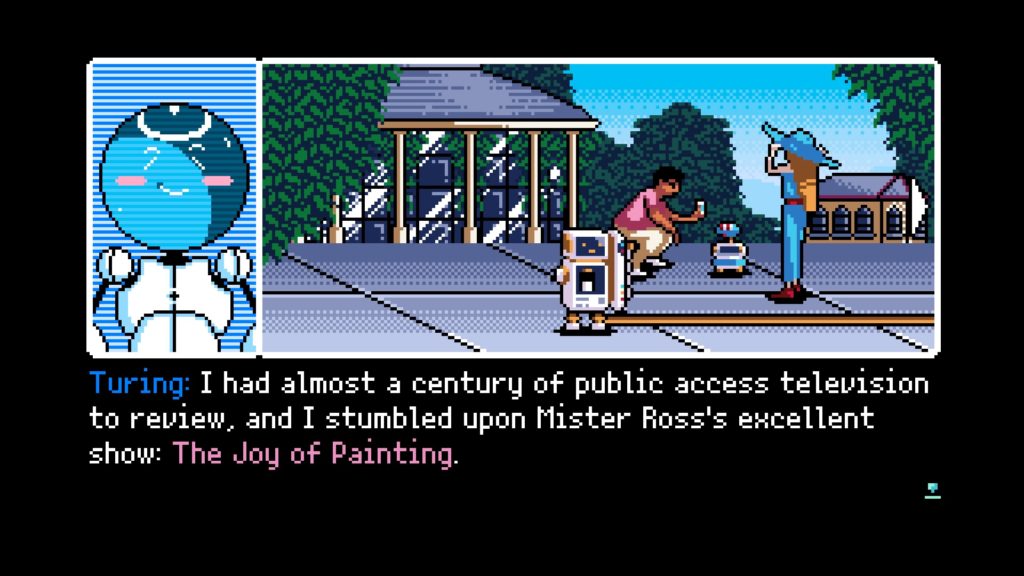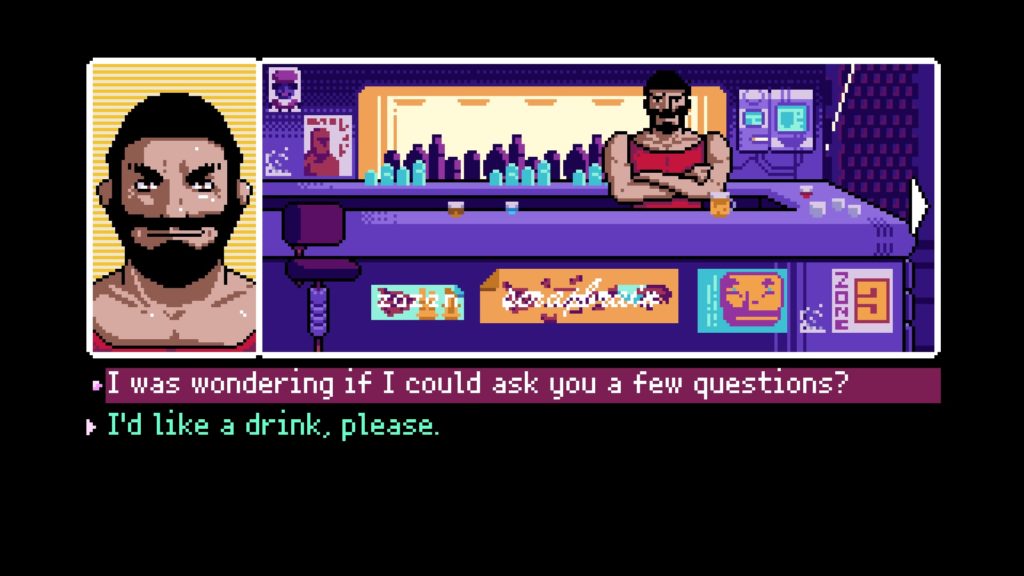
2064: Read Only Memories Review
Developer: Midboss
Director: John “JJSignal” James
Producer: Matt Conn
Programmer: Ted DiNola
Composer: Matthew Hopkins
Review by Billy Seguire
 The year is 2064. Neo-San Francisco, a city built on the major innovations of robotics and bioengineering in the past several decades, is on the verge of a cultural revolution. Society is divided over where the progression of technology is taking humanity, and the creation of the world’s first sapient machine could push rising tensions over the edge. This is the setting of 2064: Read Only Memories, a point-and-click adventure game starring an unlikely journalist uncovering the truth in the space where media and technology collide. It’s a narrative that at first seems at odds with its aggressively cute retro-visuals, but an emphasis on story, well-rounded characters, and an old-fashioned visual aesthetic makes Read Only Memories an impressive accomplishment.
The year is 2064. Neo-San Francisco, a city built on the major innovations of robotics and bioengineering in the past several decades, is on the verge of a cultural revolution. Society is divided over where the progression of technology is taking humanity, and the creation of the world’s first sapient machine could push rising tensions over the edge. This is the setting of 2064: Read Only Memories, a point-and-click adventure game starring an unlikely journalist uncovering the truth in the space where media and technology collide. It’s a narrative that at first seems at odds with its aggressively cute retro-visuals, but an emphasis on story, well-rounded characters, and an old-fashioned visual aesthetic makes Read Only Memories an impressive accomplishment.
Playing Read Only Memories is like taking a trip back to the DOS era. The point and click genre has seen a recent resurgence on the indie scene, but the intentional nostalgia for the pixel art and simplified gameplay of early 90s PC staples is where Read Only Memories thrives. It plays well into the game’s dual themes of technology and media in the digital age. Playing in first person, clicking through environmental puzzles, and choosing from dialogue options in an endless array of conversations, you find yourself locked into genre conventions which haven’t been referenced for decades. Has absence made the heart grow fonder? The modern polish made the experience of returning to this old style of gameplay engaging and fun. While it’s clear that while it’s taken inspiration from the past, the effort has been applied to smooth the outdated edges in every way.

For some, the focus on story and character in Read Only Memories could define it more as a visual novel than a game, but definitely there’s enough to the system to make it a fulfilling gameplay experience. The actions and dialogue choices that define Read Only Memories‘ main mechanics push you towards interaction with the characters of Neo-SF in the same way Mass Effect made you want to bond with your crew on a truly personal level. You feel a connection, a relationship with those you choose to trust growing organically as the game goes on. It’s also an incredibly funny and entertaining game when it wants to be. The first time I tried to interact with a poster in the main character’s apartment, for example, led me to the message “careful, that’s a load bearing poster” in reference to a classic line from The Simpsons, and the combination of that sort of subtle, world building humour and sarcastic responses available from the protagonist makes for a great time. It made me want to poke around in all the corners to see what I could discover, and I was often delighted by what I found.
The high definition art of Read Only Memories breathes new life into old pixels. While the visuals are static and blankly composed in the style of old point and clicks, the details of each scene are perfectly designed to create a snapshot of Neo-San Francisco in all its retro-futurist glory. Filled with atmosphere, these scenes give you exactly what you need to look forward to multiple visits to the same location as you make your way back and forth across the city map. The original soundtrack bounces between DOS-era soundboards and noir synths and saxophones effortlessly, crafting a well rounded experience that caters to those who delight in finding themselves fully immersed.
New to this version of the game, the voice acting in Read Only Memories far surpassed anything I was expecting from an indie game. The fully voiced story added life and depth to characters who were already fully realized in text. Turing’s childlike optimism, for example, makes empathizing with the ROM a simple task. To hear him talk in the early game about subjects such as his love for Bob Ross with such joy is endearing, and the voice acting ensures him an instant home in your heart. Likewise, letting the emotion and innocence of his voice drain into painful agony as the story takes a darker turn is a knife to the heart in a way that hurts far more than simple text ever could. For those who value authenticity to the genre, you do have the option of disabling voices for a less anachronistic experience, but you’ll be denying yourself of so much of the atmosphere that I couldn’t imagine playing without it. Especially considering the long bodies of text you’ll be going through even over the course of a single playthrough.

As said before, choice in dialogue options is the main component of the gameplay you encounter in Read Only Memories. You play as an investigative journalist uncovering a conspiracy, and as such, you need to know how to play people to succeed. This was what felt the most satisfying to me. I felt genuine remorse when I struck out with an interesting character at the bar, forever cutting off that branch of the storyline. The game gives you enough options to recover from fumbles and I never felt like I was truly locked out from progressing forward in the game, but I did keep wondering just what might have happened if I played a section differently. The branching path of this story offers considerable motivation for replayability, and the ability to create multiple save points and skip through dialogue does make the prospect of going back to replay that one scene a distinctly tempting offer.
Of course, this is a point and click, so you also have to manage your inventory and decide for yourself where to do what in the world. My playthrough had me taking a carton of spoiled milk out of the fridge at the start of the game and trying (without success) to pour the milk on practically everything I encountered. Each time, to my delight, resulted in a different response from the in-game text explaining to me why that wasn’t a particularly good idea. Even attempting the same combination at different points will occasionally produce superficially different results. It’s clear this is a game made with love for the genre and the developers took every opportunity to hide the seams of their game to an exceptionally thorough degree.

To break up the expected gameplay, there are also a series of minigames available both as side-diversions and components of the main game. Trying to redirect a cab by rerouting traffic lights or swinging by the bar to play a few more rounds on an old arcade machine were highly enjoyable experiences that gave me something new to master, keeping me refreshed and absorbed in the main story without taking me out of the DOS blueprint of the game.
The element I found most satisfying about Read Only Memories was its atmosphere of positivity and inclusion. Science-fiction is meant to be progressive, and Read Only Memories truly felt like a throwback to hard classic sci-fi not only in the questions it raised about society, but in its push for social awareness and inclusion. The character creation section of the game offered me the ability to select my own pronouns from a wide variety of options and allowed me to craft an identity for the character I was playing. Several characters within the game have alternative identities or queer partners. There’s very little this game does to make anyone feel unwelcome in its world and instead pushed for positivity and inclusion in all areas, while still keeping enough conflict present for drama.
The story, while overall loyal to the tropes of the cyberpunk genre, was surprisingly moving at points and kept me motivated to continue digging deeper into the mystery. The theme of technology, both new and obsolete, came up constantly, but it was those connections with other inhabitants of Neo-San Francisco that really mattered. It truly is a game that’s all about how you interact with these characters. There is so much history and connection between your character and certain NPCs of the world that I thought I may have missed an earlier game in the series that established their connection, and it’s this detail of the narrative and gameplay that makes Read Only Memories stand out.

The Verdict
Buy It! If you’re a fan of the cyberpunk genre, you owe it to yourself to at least try out this game. The promise of Read Only Memories is to bring you back into the old fashioned gameplay of DOS era PC games while offering some retro-futuristic flair that appeals to modern audiences. The story allows the player to directly engage and connect with the material in a way they never could as a passive viewer, in a context where technology is at the forefront of their thought. It presented a hard sci-fi story with at least one scene that truly moved me. This feels like Blade Runner’s hot, more socially aware younger brother. I’ll definitely go back to it again.
Rogues Portal was provided a code for the PS4 version of the game for the purpose of this review.



![[REVIEW] NICK FURY VS. FIN FANG FOOM #1](https://geekd-out.com/wp-content/uploads/2025/03/nfvfff1-feat-150x150.jpg)
2 thoughts on “2064: Read Only Memories Review”